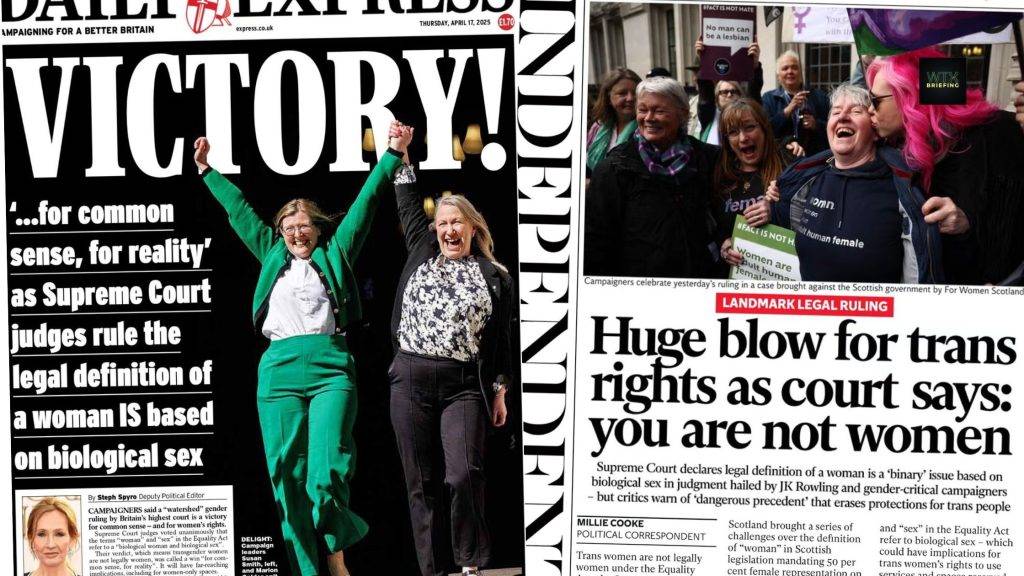Almost all of the UK newspaper front pages today lead with the landmark ruling that transwomen are not women and instead a woman is defined by biological sex. The ruling will now see huge changes to public and private sector gender guidance.
The UK Supreme Court yesterday ruled that the legal definition of a woman is based on biological sex. The judges say the “concept of sex is binary”, while cautioning that the landmark ruling should not be seen as a victory of one side over another. The court added, transgender people still have legal protections from discrimination.
Read the full 88-page judgment here.





Supreme Court’s historic decision: Transwomen ‘not women’
Explainer: The headline uses provocative and absolutist language with “historic decision” and the quote “not women” to spark strong emotional reactions. It frames the ruling in a way that suggests finality and controversy, likely to inflame debate. Quoting such a stark phrase without context can sensationalise the issue and polarise readers.
- Metro says Britain’s highest court has said in a landmark ruling after “years of bitter debate.” The Scottish government introduced laws in 2018 to include people given a legal document called a Gender Recognition Certificate. It would allow them to use single-sex areas, including women’s toilets and changing rooms.
Trans women are not women
Explainer: The headline uses blunt and provocative language that’s likely to spark strong emotional responses and controversy. Its absolutist phrasing lacks nuance, encouraging polarisation. Without context or attribution, it sensationalises the topic, inviting outrage and reinforcing bias in a deeply sensitive and complex debate.
- The Daily Telegraph says the Supreme Court’s ruling on women’s rights is expected to lead to changes across single-sex spaces, including NHS wards, and elite sport. Campaigners Susan Smith and Marion Calder are pictured on the front smiling.
Historic victory for women … and common sense
Explainer: The headline uses celebratory and subjective language to frame the outcome as unquestionably positive. Phrases like “historic” and “common sense” imply moral and logical superiority, reinforcing a particular viewpoint while dismissing opposing perspectives, a common tactic to rally support and minimise dissent.
- Daily Mail reports it’s a “historic victory for women … and common sense,” asking whether Labour will “finally act to protect their rights?” Women’s rights groups and MPs celebrated the ‘victory for common sense’ and called on the Government to ensure that activist managers and civil servants abided by the ruling.
Equality policies in chaos as court defines a woman
Explainer: The headline uses dramatic language like “in chaos” to evoke a sense of crisis and urgency. It frames the court’s action as disruptive, implying instability and conflict. The phrasing suggests a definitive, possibly controversial, ruling that challenges existing norms, fuelling debate and drawing in readers through sensationalism.
- The Times says “equality policies in chaos” as it writes every organisation in Britain has been told to revisit its equality policies. “The ruling means they will have legal backing to protect single-sex spaces such as changing rooms, lavatories and women’s shelters on the basis of biological sex,” the paper writes.
‘VICTORY!…for common sense, for reality‘ as Supreme Court judges rule the legal definition of a woman IS based on biological sex
Explainer: The headline uses emphatic language like “VICTORY!” and “common sense” to present the ruling as unquestionable and triumphant. The phrase “for reality” implies that opposing views are out of touch, while focusing on “biological sex” simplifies a complex issue, sensationalising the decision to provoke strong reactions and reinforce a particular ideology.
- The Daily Express leads with Harry Potter author JK Rowling who told the paper she “welcomed” the Supreme Court’s decision, which the paper says campaigners have hailed the ruling as a “watershed.”
Row will rage on in wake of landmark gender ruling
Explainer: The headline uses the word “rage” to suggest ongoing, intense conflict, heightening drama and emotional tension. “Landmark” implies major significance, while framing the situation as a heated “row” builds anticipation for controversy, drawing readers in with the promise of continued debate.
- The Herald reports public bodies and firms will now have to ensure they do not ‘fall foul of the law’, saying the gender row is here to stay.
Campaigners hail landmark court ruling as a ‘watershed‘ for women
Explainer: The headline uses positive, celebratory language like “hail” and “watershed” to frame the ruling as a significant and triumphant moment. It suggests unanimous approval among campaigners, emphasising the ruling’s importance while subtly implying that it marks a defining, irreversible change for women’s rights.
- The Scotsman says the “Scottish Government defeated” as the UK’s top judges rule a woman is defined by ‘biological sex’.
Court ruling on gender could affect NI decisions
Explainer: The headline uses uncertainty with “could” to imply potential widespread consequences, creating intrigue. It suggests that the ruling has far-reaching effects, particularly on Northern Ireland (NI), which may prompt readers to consider the broader implications without providing full context. This tactic heightens interest while leaving room for speculation.
- Belfast Telegraph reports that the UK decision “is likely to form the basis for future rulings in Northern Ireland, despite the different laws on equality.”


